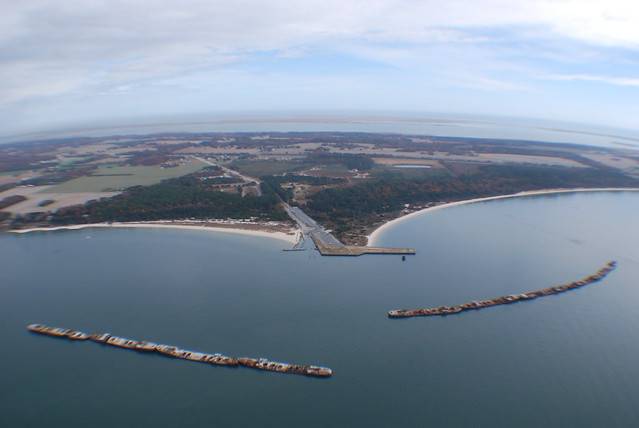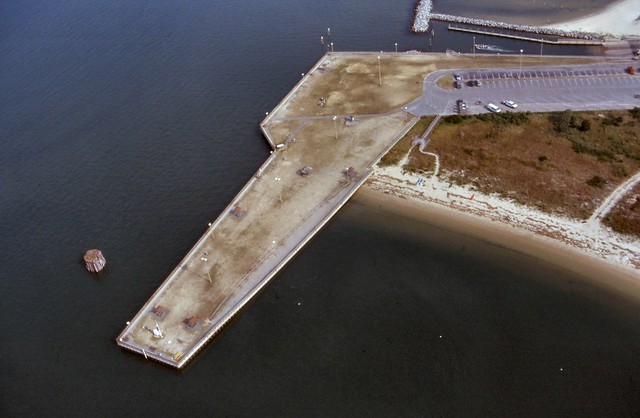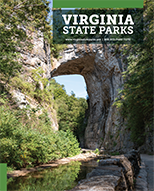Read Our Blogs
March Park of the Month: Kiptopeke State Park
Kiptopeke State Park
From Farm & Ferry Landing to Park & Protected Lands

This aerial photo shows the concrete ships as a breakwater and the fishing pier.

On the Eastern Shore of Virginia, Kiptopeke State Park makes a great family trip!
As a former Texan, I am well-aware of regional pride and there is only one other place that has a sense of regional pride that is on par with Texas--that is the Eastern Shore! Connections with the land, the agriculture, and the regional history lend a sense of personal pride to Eastern Shore residents that is well-earned. Otherwise known as the Delmarva (Delaware, Maryland, Virginia) peninsula, Virginia's section of the Eastern Shore is the site of Kiptopeke State Park. Located on the Chesapeake Bay, the park is great place for a fishing trips, family reunions, or group camping trips.
Kiptopeke State Park is a relatively small 600+ acre park that features hiking trails, 24 hour lighted fishing pier, campgrounds, a yurt (part tent/part cabin), rental RV's, and six-bedroom lodges. It is a one-stop shop for outdoor recreation! Kiptopeke also has picnic shelters, playgrounds, a hawk observatory platform, kayak rentals in season, and great educational programs. But before the area became a busy state park, it was a farmland and the ferry landing.

Kayak fishing around the concrete ships is a popular activity at the park!
The Eastern Shore has a rich maritime, railroad, and agricultural history and the land that is now Kiptopeke State Park played a big part in those rich traditions. Some historians, after reviewing old maps and forestry data, seem to think that located behind screen of trees in the park, was a "Sunday field." Sunday fields were usually smaller fields or kitchen gardens that farmers would till inside a forest clearing so they could work the land on Sundays without their neighbors knowing that they were breaking the Sabbath.

Potatoes! Photo courtesy of the Cape Charles Historical Society.
Potatoes were a popular crop on the Eastern Shore. New technology, like viticulture, is helping farmers on the Eastern Shore reduce environmental impacts while increasing yields.
I think these "Sunday fields" speak to the ingenuity and the resourcefulness of these hardy souls who struggled against isolation, tried to hedge against fluctuating agricultural markets, and desperately wanted a better life for themselves and children. A few dollars saved from produce used or sold from a "Sunday field" could make a world of difference to a struggling farmer enabling the family to buy new equipment, more land, or an automobile.

Modern innovations in farming made a big difference for farmers and their crop yield. Photo courtesy of Cape Charles Historical Society.
The park's 24-hour lighted fishing pier is actually the former ferry landing that transported agricultural goods, people, and freight back and forth from Norfolk to Kiptopeke and on to Cape Charles. Connecting with the railroad, goods and produce would eventually end up at markets in New York City. Leaving the peninsula was a big deal for families--some only making the trip to Norfolk only once or twice a year. The ferry landing was a busy place in the early 20th century, but with the construction of the Chesapeake Bay Bridge Tunnel, the ferry service was discontinued in the mid-60s.

An aerial view of the fishing pier shows how it was configured as a ferry landing.

The DelMarVa ferry glides into Kiptopeke between the concrete ships. Photo courtesy of the Cape Charles Historical Society.
Dedicated as a state park in 1992, Kiptopeke State Park, open year-round, is known as a great place for fishing, camping, and birding. Over the years, the park has been replanting former farmland with trees and shrubs to accelerate its conversion back to coastal forest. You might notice many newly cut pine trees in the park. This was part of a habitat restoration project.

A recently complete pine thinning project was part of a larger habitat restoration plan.
Coastal forest habitats are key to the long-term survival of many migratory bird and hawk species. NOAA's Coastal Zone Management program recently funded a project that, among other things, paid for clearing of thickets of pines so that hardwood trees can grow and paid for mini-habitats at each six-bedroom lodge. You'll find that with these pine trees cleared and with the new trees and shrubs at each lodge, the opportunities to observe and photograph birds are so much better!

Newly planted trees and shrubs at the lodges should bring birds closer in for great photos from the porches!
Look for more Park of the Month stories about Kiptopeke this month featuring suggested Kiptopeke State Park activities, itineraries, and fishing advice for your next visit! Click here for a schedule of upcoming events--the list is being updated monthly so check back often! Be sure to book your reservations now. Virginia State Parks' campgrounds opened on March 1 and the six-bedroom lodges are open year-round.
Call 1-800-933-PARK today to book your stay!
If you have read the article and have a question, please email nancy.heltman@dcr.virginia.gov.














